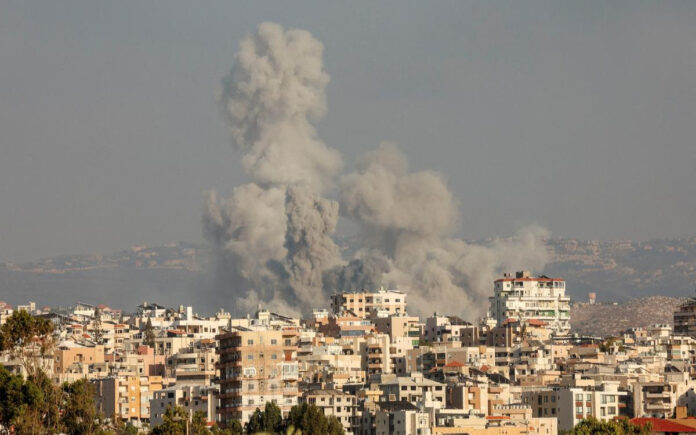After weeks of intense diplomacy aimed at securing a ceasefire between Israel and Hezbollah, the United States has opted for a new approach: letting the conflict in Lebanon play out. Just two weeks ago, the U.S. and France were pushing for a 21-day ceasefire to avert an Israeli invasion of Lebanon. However, that effort unraveled following the assassination of Hezbollah leader Syed Hassan Nasrallah by Israeli forces and Israel’s launch of ground operations in southern Lebanon on October 1, along with airstrikes that decimated much of Hezbollah’s leadership.
Now, U.S. officials have abandoned their calls for a ceasefire, arguing that the situation has shifted.
“We do support Israel launching these incursions to degrade Hezbollah’s infrastructure so ultimately we can get a diplomatic resolution,” said State Department spokesperson Matthew Miller at a press briefing earlier this week.
The shift in approach reflects conflicting U.S. objectives—containing a widening Middle East conflict while also attempting to significantly weaken Hezbollah, a powerful Iranian proxy.
This strategy is practical but fraught with risks. While defeating Hezbollah would benefit both the U.S. and Israel by removing a shared adversary that threatens Israel’s northern border, the expansion of Israel’s military campaign risks escalating the conflict further.
Jon Alterman, a former State Department official, noted the delicate balance at play: “The U.S. wants to see Hezbollah weakened but must weigh that against the risk of creating a vacuum in Lebanon or provoking a regional war.”
A Strategy Born of Necessity
The current hostilities began when Hezbollah launched missiles at Israeli positions following the October 7, 2023, attack by Hamas on Israel, which triggered the Gaza war. Since then, Israel and Hezbollah have been exchanging fire. Israel’s military operations, including strikes on Hezbollah communications, have inflicted serious damage on the group, with thousands of Hezbollah fighters reported wounded.
Following Nasrallah’s assassination, which the U.S. described as “a measure of justice,” President Joe Biden again called for a ceasefire along the Israel-Lebanon border. However, Israel proceeded with its ground invasion, and within days, the U.S. withdrew its ceasefire appeal, instead backing Israel’s campaign.
Aaron David Miller, a former U.S. Middle East negotiator, explained that Washington saw advantages in Israel’s actions: “It created momentum where the administration likely thought, ‘Let’s make a virtue out of necessity.'”
As things stand, no substantial ceasefire negotiations are underway. European officials suggest that Israel is prepared to continue its military operations for “weeks if not months.” Two U.S. officials indicated that such a timeline may indeed be realistic.
From the U.S. perspective, there are potential benefits to the continued Israeli campaign. Weakening Hezbollah, Iran’s most formidable proxy militia, could reduce Tehran’s influence in the region and lessen threats to both Israel and U.S. forces. Washington also hopes that sustained military pressure may force Hezbollah to lay down its arms, creating an opening for a new government in Lebanon, one that could push the militant group out of power.
Jonathan Lord, a former Pentagon official now with the Center for a New American Security, expressed skepticism about the feasibility of this goal: “Many Lebanese people resent Hezbollah’s dominance in Lebanon. But at the same time … this change is being imposed through a very violent campaign.”
Also Read | Major Cyberattacks Strike Iran as Tensions with Israel Escalate
A Risk-Laden Strategy
The ultimate U.S. goal is to enforce United Nations Security Council resolution 1701, which mandates the UNIFIL peacekeeping mission to help the Lebanese army secure its southern border with Israel. U.S. officials believe that conversations to achieve these goals can proceed even as the fighting continues. However, analysts caution that the conflict significantly heightens the risk of a broader regional war, especially as the region awaits Israel’s response to Iran’s recent missile strike.
The situation also presents the risk of Lebanon descending into a state resembling Gaza—a territory devastated by a year of Israeli military operations that have left nearly 42,000 people dead, according to Gaza health officials. U.S. officials have stressed that Israel’s offensive in Lebanon must not mirror its operations in Gaza.
Despite these dangers, Alterman, now head of the Middle East program at the Center for Strategic and International Studies, argued that the current trajectory of Israeli military actions will likely persist. “Netanyahu sees all of his gambles paying off, and it seems unlikely that Israel will halt its campaign any time soon,” he said.



